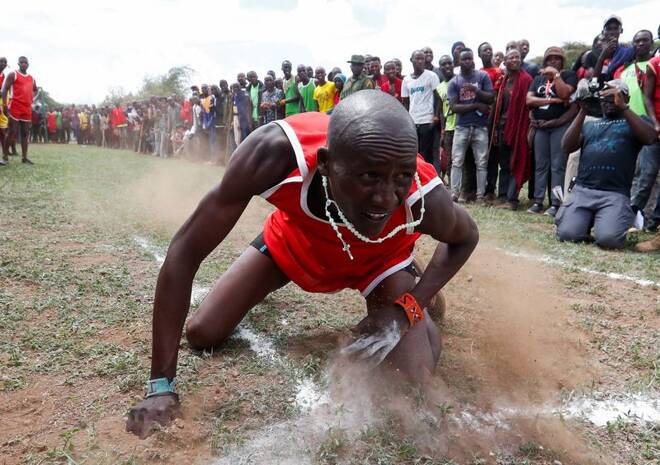Advertisement
Advertisement
Kenya’s Maasai warriors gather to celebrate “Maasai Olympics,” a rite of passage
By:
KIMANA SANCTUARY, Kenya (Reuters) - Hundreds of youths from the Maasai pastoralists in Kenya gathered on Saturday at a wildlife sanctuary to participate in "Maasai Olympics," a ceremony promoted by conservationists as an alternative rite of passage for young men in the community.
KIMANA SANCTUARY, Kenya (Reuters) – Hundreds of youths from the Maasai pastoralists in Kenya gathered on Saturday at a wildlife sanctuary to participate in “Maasai Olympics,” a ceremony promoted by conservationists as an alternative rite of passage for young men in the community.
The spectacle, in which youthful morans or warriors compete in various games and takes place once every two years, was held in Kimana Sanctuary on the foothills of Mount Kilimanjaro near Kenya’s border with Tanzania.
The games that include spear throwing, athletics and high jump were improvised as an alternative ritual of transition to manhood for Maasai boys who traditionally were required to fight and kill a lion to prove their bravery and manhood.
To curb the practice, Maasai cultural leaders partnered with Big Life Foundation, a conservation pressure group, to provide an alternative rite of passage, eventually giving birth to the “Maasai Olympics” in which young men compete to earn medals and cash prizes.
“We now co-exist perfectly with the wildlife,” community leader Matasia Nerangas said at the ceremony on Saturday.
“We share the same grazing fields and watering holes with the wild animals, and we stand to benefit more now than before.”
Craig Miller, Chief Operating Officer of Big Life Foundation said the games had helped reduce the danger to lion population in the area.
“(The) program has had a huge impact on the lion population and it is one of the few areas in Africa outside of protected areas where lion population is stable or growing,” he said.
Government-run Kenya Wildlife Services says there are about 2,000 lions in the East African country, and that the biggest threat to them and other carnivores is conflict with humans.
(Reporting by Edwin Waita; Writing by Elias Biryabarema; editing by Clelia Oziel)
About the Author
Reuterscontributor
Reuters, the news and media division of Thomson Reuters, is the world’s largest international multimedia news provider reaching more than one billion people every day. Reuters provides trusted business, financial, national, and international news to professionals via Thomson Reuters desktops, the world's media organizations, and directly to consumers at Reuters.com and via Reuters TV. Learn more about Thomson Reuters products:
Advertisement
